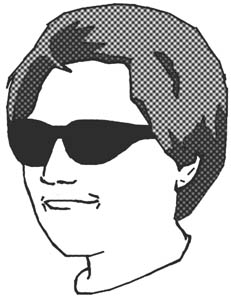![[Metroactive Features]](/features/gifs/feat468.gif)
[ Features Index | Silicon Valley | Metroactive Home | Archives ]

Techsploits Lost Machines By Annalee Newitz IT WAS one of those times when I found myself eavesdropping on a conversation, not out of prurience, but because it was the kind of discussion I'd probably be having if any of my friends were around. A group of academics sat near me on the bus, engaging in awkward intellectual flirtation about neurasthenia, one of my favorite 19th-century diseases of the mind. Neurasthenia was one of those catchall maladies, as depression is now: it referred to any disorder of the "nerves" that caused anxiety, random pain, melancholy or fainting. Somehow, perhaps because the holiday season always makes me think about death, the arch banter about retro psychological problems reminded me of all the things we've lost to what is allegedly scientific progress. I don't care if we leave behind crap like homemade clothes and horseback riding as a mode of transportation and sitting in the parlor next to the fire reading by candlelight. I'm referring to all the cool machines and idealistic theories we've lost in our effort to find the "truth" or get a grant or sell the newest, shiniest widget in the universe. For example: I'm sad about trains. I never lived during a time when locomotives were cutting edge, and yet I still miss them. I often imagine a very surly Henry David Thoreau standing next to Walden Pond, out in the bug-infested, hot damp of the mid-19th-century Massachusetts countryside, watching a distant train go by, feeling as if he were watching the future rip a hole in his brain. I like to go to museums where you can see the huge, barrel-bodied, old-fashioned train engines that look like Japanese giant monsters. Most of all, I miss a world where public transportation was the only way to get around fast. The train world was a pre-car world, a place where there were no asphalt roads or traffic jams or freeway accidents. Of course, I know this is the worst kind of nostalgia: trains were run on coal and belched ridiculous amounts of smoke into the atmosphere. They were crowded and dirty, full of noisy people who snored all the way from Boston to New York while you tried to ignore them. Nevertheless, I wish we'd stuck with trains instead of getting hooked on those newfangled automobiles. I also miss spaceships for humans. The space shuttle is just a glorified airplane compared to the ships that flew to the moon. It's not so much that I wish we could have more of those cramped rockets where life in zero G sucks ass but rather that we could reawaken our hope that very soon we would be sailing between the stars on great adventures, meeting aliens and discovering new worlds. I guess I miss the idea of spaceships. I know: I've watched too much Star Trek and read too much Amy Thomson. But still, whenever I see one of those old-fashioned pictures of a rocket ship or flying saucer circa 1954, I feel lonely and tired. It's as if the future has been drained out of me. We will never seek out new life and new civilizations. We will only go where we've gone before. And that's why I'm in mourning for so many other dying and dead technologies: the Merlin hand-held proto-Game Boy that I had in sixth grade, Atari game systems, Commodore 64s, reel-to-reel tape players, water pics Waterpiks, lava lamps, flip phones, VCRs, Betamaxes, fax machines, coaxial cable, cable cars, carburetors, electric belts, orgone boxes and hot-water bottles. Do you ever feel as if there was some future we could have reached if we hadn't gotten sidetracked by blenders and speakers and cars? Maybe in some alternate universe, humans don't waste their time with ICBMs and faxes; maybe those alternate humans are healing themselves with nanotech and using spaceships to explore the galaxy. But then again, maybe beauty is in the digression. Perhaps the whole point of scientific progress is to pick things up, stare at them a lot and put them down again. Without meandering a bit, we'd never have had silly pseudodiseases like neurasthenia and borderline personality disorder, but neither would we have had genomics and the Internet and carbon nanotubes. Progress is not always progress, as it were. I suppose that's why I miss the trains.
Annalee Newitz (nostalgic@techsploitation.com) is a surly media nerd who has absolutely zero nostalgia for clock radios and is ready for them to die.
Send a letter to the editor about this story to letters@metronews.com. [ Silicon Valley | Metroactive Home | Archives ]
|
From the December 25-31, 2003 issue of Metro, Silicon Valley's Weekly Newspaper.
Copyright © Metro Publishing Inc. Metroactive is affiliated with the Boulevards Network.
For more information about the San Jose/Silicon Valley area, visit sanjose.com.